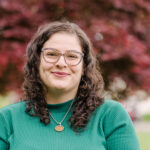
For centuries, media has portrayed Arab culture as misogynistic and homophobic, leaving little room for the possibility that queer Arab communities exist and thrive. Adding to this sense of erasure is the belief some Arab communities have in thinking that homosexuality is not inherently Arab but something the Western world brought to the Arab world. However, the reality queer Arabs and those in the diaspora live is much more positive and complex.
Mejdulene Bernard Shomali, a queer Palestinian poet and associate professor in the department of gender, women’s, and sexuality studies,wrote the first study of desire that addresses the contemporary cultures and lives of queer Arab women in her book, Between Banat: Queer Arab Critique and Transnational Arab Archives (Duke University Press, 2023).
“My research looks at how Arab people experience and narrate their queerness in unexpected ways. For example, Arabs may be in same-sex relationships but might not claim gay or lesbian identities,” Shomali explains to Lynn Pasquerella, president of the American Association of Colleges and Universities and host of The Academic Minute, a daily show featuring faculty from colleges and universities worldwide speaking about their cutting-edge research. “Many queer Arabs might not check off Western benchmarks of LGBT identity, like being ‘out.’ Some of the existing Arabic terms for queer people have negative connotations and are also not popular.”
UMBC’s Academic Minute series
Shomali joined seven other UMBC scholars this fall in UMBC’s first Academic Minute series, featuring the latest research in media and communication studies; modern languages, linguistics, and intercultural communication; language, literacy, and culture; philosophy; gender, women’s, and sexuality studies; sociology, anthropology, and public health; and history. This series is republished on NPR podcasts and Inside Higher Ed.
Learn more about Mejdulene Bernard Shomali’s research:
- She is currently a 2023-24 Society for the Humanities fellow at Cornell University, where she is working on a project called Palestine Matters: Aesthetics, Embodiment, and Pleasure in Palestine and also teaching a seminar called “Feeling Free: Radical Aesthetics and Political Affects.”
- Her essays on gender and sexuality in transnational Arab culture include:
Learn more about UMBC’s gender, women’s, and sexuality studies.





